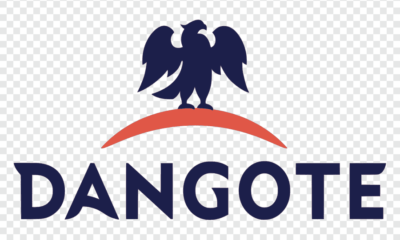NEWS
Hundeyin Leaks America’s, Europe’s Masterplan Against Dangote Refinery, African Economy

The unending efforts of neo-colonists to tie Nigeria and Africa down with the chains of poverty and underdevelopment have come to the fore over the challenges being encountered by the Dangote Petrochemical and Petroleum Refinery.
One of Nigeria’s foremost investigative journalists, David Hundeyin, on Saturday revealed via a strong narrative on his page on micro-blogging site, X, that paid American and European interests were working to stifle the 650,000bpd refinery situated in Nigeria.
Hundeyin revealed how “an international NGO called Dialogue Earth (formerly known as China Dialogue Trust)” has being throwing huge sums at journalists to push the narrative that the “Dangote Refinery is terrible for the environment”.
He maintained that the objective was to give a dog a bad name in order to hang it. That is, give the Nigerian government sufficient evidence to ‘kill the Dangote Refinery’.
ALSO READ: Atiku Urges Resolute Actions To Support Dangote Refinery
In an apparent wake up call to the Nigerian government and the entire African continent, Hundeyin pointed out that India had taken drastic action against their underground agent, by blacklisting him.
He stated, “Basically, this London-based NGO is headed by Sam Geall, an Oxford professor and is funded by several American intelligence fronts such as Ford Foundation and ClimateWorks (which is blacklisted in India for funding organisations working against India’s national interest).”
He wondered why “Africa’s largest oil producer having no functioning oil refinery to beneficiate its own oil was not a problem for Dialogue Earth and the American CIA fronts who fund it.”
Hundeyin wrote, “I debated long and hard whether to do this publicly, but I think a message needs to be sent to a group of external interests working in tandem with the internal interests described in the quoted tweet to counteract the interests of half a billion West Africans. A message that at whatever level we exist, we take our destiny seriously and we are not to be trifled with.
“Last week, I received an N800,000 offer from an international NGO called Dialogue Earth (formerly known as China Dialogue Trust) to write an article essentially saying that Dangote Refinery is terrible for the environment because something, something. “Environmental Concerns,” something, something “Climate Change,” something, something “Energy Transition Policy,” something, something “COP 28.”
“The (unstated but clearly implied) thrust of the brief was for a prominent local voice to put their name on an article that is an argument or a premise for the Nigerian government to kill the refinery based on its “energy transition commitments” and “environmental policy.” This conclusion wasn’t immediately apparent when they reached out to me, but I suspected where it was heading, and I quickly accepted the offer so that I could see the brief and obtain hard evidence. I’ve attached screenshots from the brief below.
“Basically, this London-based NGO is headed by Sam Geall, an Oxford professor and is funded by several American intelligence fronts such as Ford Foundation and ClimateWorks (which is blacklisted in India for funding organisations working against India’s national interest). For whatever reason, it is now quietly mobilising a resistance campaign against what it describes as “Nigeria’s first refinery.” Apparently, the status quo of Africa’s largest oil producer having no functioning oil refinery to beneficiate its own oil was not a problem for Dialogue Earth and the American CIA fronts who fund it.
“The human poverty caused by exporting this raw material and importing refined fuel was not bad for the environment. Also, the fact of European refiners regularly blending West African fuel cargoes with toxic waste and sulphur content 200 times the European legal limit (leading to asthma, bronchitis and eye infections in West Africa) was also not bad for the environment. But Nigeria having a refinery that will wean West Africa off import dependency on those European refiners (and allow West Africa control the sulphur content of its own fuels) is where Dialogue Earth and its funders draw the line. That one is bad for the environment, and David Hundeyin should write an article calling for the refinery to be shut down or limited.
“I’m putting this out there publicly so that nobody will henceforth use the term “conspiracy theory” when it is pointed out for the umpteenth time, that there are American and European state and private interests that are heavily invested in keeping Africa exactly as poor as it is, and that they regularly push levers most of us do not even know exist, to make sure that this status quo is protected. These people believe that Africans should not exist or have nice things in this world. Apparently, the sole purpose of our existence is to enhance their experience of the planet and all that it has to offer.
“It is because of them that I have to make a public spectacle out of this, even though I know that doing this is probably going to cost someone their job. The message needs to be passed that as poor as we are, you cannot convince us to campaign for the elongation of our own poverty by commissioning $500 hack jobs in the hope that we will be greedy enough to only see the money and ignore the bigger picture of what we can clearly see you trying to do.
“I will reiterate something I have said multiple times – I am not a believer in the religious faith called Climate Change/Saving The Environment. I care exactly as much about the environment as do the rich white men who destroyed it to begin with. I firmly believe that if what it takes for Africa to industrialise is for it to burn so much fossil fuel that snow stops falling in Wisconsin and it starts raining concentrated sulphuric acid in Doncaster, it is not too big a price for Europe and North America to pay – it is certainly not bigger than the price Africa had to pay for Europe and North America to develop.
“It is and will continue to be 100% OUR prerogative to determine what to do with our hydrocarbons. It is not the rich white men hiding behind these “Climate Advocacy NGOs” who will tell us what to do with our energy reserves, and by what means we are allowed to escape the poverty that they engineered for us.
“I might not be a fan of Aliko Dangote or his monopolistic business practices – as is well known – but I’m also smart enough to know when rich white men in DC, Houston, Rotterdam and London and trying to use me as a marionette in their 400 year-old coloniser games. If you are reading this and you are one of the rich white men whose economic interests are threatened by Nigeria refining its own oil, you should come out and fight Aliko Dangote by yourself.
“Or at least go find a much stupider African to do your dirty job – there’s plenty of those.
“It will never be me.”
NEWS
PETROAN Backs Naira-for-Crude Policy, Hails Potential For Lower Fuel Prices
The Petroleum Products Retail Outlets Owners Association of Nigeria (PETROAN) has expressed strong approval for the Federal Executive Council’s decision to continue the Naira-for-Crude policy, calling it a potential turning point for Nigeria’s energy sector.
In a statement to journalists in Abuja, PETROAN’s National Public Relations Officer, Joseph Obele, said the association is confident that the policy, combined with recent declines in global crude oil prices, could lead to a reduction in fuel costs for Nigerian consumers.
“We want to sincerely commend the Federal Executive Council for its decision to fully implement the Naira-for-Crude policy,” Obele said.
READ MORE: JUST IN: Dangote Refinery Cuts Petrol Price To N865 Per Litre
“This is a strategic move aimed at reducing our dependence on foreign exchange, enhancing local refining capacity, and ultimately stabilizing the downstream sector.”
The Naira-for-Crude policy allows domestic refineries, including the Dangote Refinery, to purchase crude oil in Naira instead of U.S. dollars.
PETROAN believes this shift will relieve pressure on the foreign exchange market and foster increased investment in Nigeria’s refining infrastructure, ultimately strengthening the nation’s energy security.
Obele also praised President Bola Tinubu and other key leaders, including the Minister of State for Petroleum Resources, Senator Heineken Lokpobiri; the Minister of Finance and Coordinating Minister of the Economy, Wale Edun; and top executives at NMDPRA and NUPRC, for their commitment to reforms that prioritize the welfare of Nigerian consumers.
“This is a policy that supports local production and shields our economy from the volatility of the global oil market,” Obele said.
“When our refineries buy crude in Naira and process it locally, the cost of production reduces significantly, and that benefit can and should be passed on to end users.”
Obele also pointed out that the current global decline in crude oil prices — driven by reduced demand in major economies and increased output from non-OPEC producers — provides a unique opportunity for Nigeria to adjust local fuel prices.
He attributed the drop in oil prices to broader international economic shifts, including past U.S. trade policies that contributed to a global economic slowdown.
“President Trump’s policy of reciprocal tariffs in the past contributed to the global economic slowdown, which in turn has had a deflationary impact on oil prices,” Obele added.
Despite fluctuations in the international oil market, PETROAN remains optimistic that the Naira-for-Crude policy will shield Nigeria from external shocks.
The association expressed hope that Nigerian consumers will soon begin to experience both more stable fuel supply and reduced prices at the pump.
“With the Naira-for-Crude policy in place, we are hopeful that Nigerian consumers will soon start to feel the positive effects — not just in terms of stable supply, but in actual price reductions at the pump,” Obele concluded.
PETROAN reiterated its commitment to supporting policies that encourage local refining, conserve foreign exchange reserves, and ultimately provide lasting relief to Nigerian fuel consumers.
International News
US Missionary Abducted During Church Service In South Africa
A US missionary was kidnapped at gunpoint while leading a prayer service at a church in the coastal city of Gqeberha, South Africa, on Thursday evening.
Pastor Josh Sullivan, 45, was taken by four armed and masked men who stormed the Fellowship Baptist Church in Motherwell during his sermon, authorities reported on Friday.
The attackers, who reportedly robbed two cell phones before abducting Sullivan, left the church in a vehicle with the pastor.
SEE ALSO: Gunmen Kidnap Navy Officer, Two Others In Abuja
“They knew him by name,” said Reverend Jeremy Hall, a fellow pastor in the area. “They took him at gunpoint and forced him into his car.”
The abduction took place as Sullivan was hosting a prayer meeting attended by around 30 people, including his wife and six children.
The vehicle was later found abandoned approximately 1.5 kilometers from the church.
Police are investigating the possibility that the kidnapping was motivated by financial gain, with suspicions of ransom demands.
Kidnapping for ransom has been on the rise in South Africa, with criminal gangs increasingly targeting individuals who can bring in large sums of money.
Hall, who is also based in Gqeberha, suggested the incident was likely “financially related,” further adding to concerns about the growing threat of organized crime in the region.
This follows another kidnapping in the same area earlier this week, involving a Chinese national.
Statistics from South African authorities show a disturbing trend, with over 17,000 kidnappings reported during the 2023/2024 financial year — an 11 percent increase from the previous year.
Sullivan, along with his wife and children, moved to South Africa from Tennessee in November 2018 to engage in missionary work.
Investigations are ongoing, and no arrests have been made at this time.
NEWS
Nigeria’s Crisis Proves Kanu Right, Restructuring Is The Way Forward – IPOB
The Indigenous People of Biafra (IPOB) has once again called for the immediate and unconditional release of its leader, Mazi Nnamdi Kanu, who has remained in detention since 2021.
The group said recent developments across Nigeria confirm the accuracy of Kanu’s past warnings about the country’s worsening insecurity and political instability.
In a press release signed by IPOB’s Media and Publicity Secretary, Comrade Emma Powerful, the group highlighted that Kanu’s messages from as far back as 2014 had foreseen the current state of affairs in Nigeria.
READ ALSO: Troops Neutralise 13 IPOB Members, Apprehend 3 Kidnappers
IPOB argued that the unfolding events, including the spread of violence and ethnic tensions, prove the validity of Kanu’s calls for self-determination and restructuring.
According to the statement, “The recent events in Nigeria reflect what Mazi Nnamdi Kanu had long warned about. His concerns about insecurity, national disunity, and the marginalization of various ethnic groups have continued to unfold.”
Kanu was arrested and extradited in 2021 and has since been held on charges linked to his advocacy for Biafra’s independence.
IPOB insists that his prolonged detention is unjust and that his predictions about Nigeria’s security situation should spark a national dialogue on the country’s future.
The group also pointed to Kanu’s numerous broadcasts before his arrest, where he allegedly predicted the rise of armed groups and growing instability in different regions of the country.
IPOB believes these forecasts highlight the need to revisit Nigeria’s foundation and address the structural issues fueling unrest.
Beyond Kanu’s release, IPOB reiterated its long-held position on the restructuring of Nigeria.
It described the amalgamation of various ethnic groups into one nation as a fundamental flaw that has led to persistent conflict and underdevelopment.
The group called for a peaceful and democratic process through which indigenous nationalities can decide their futures.
“We believe the lasting solution lies in giving ethnic nationalities the opportunity to decide their own paths. This must be achieved through peaceful means and mutual respect,” the statement added.
IPOB concluded its message by appealing for unity among Nigerians in the face of rising insecurity and urged all stakeholders to support constructive discussions on the country’s future.
It reaffirmed its commitment to non-violence and the protection of its people.


















